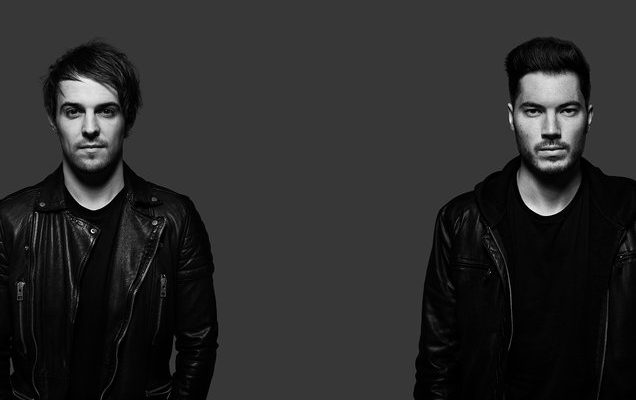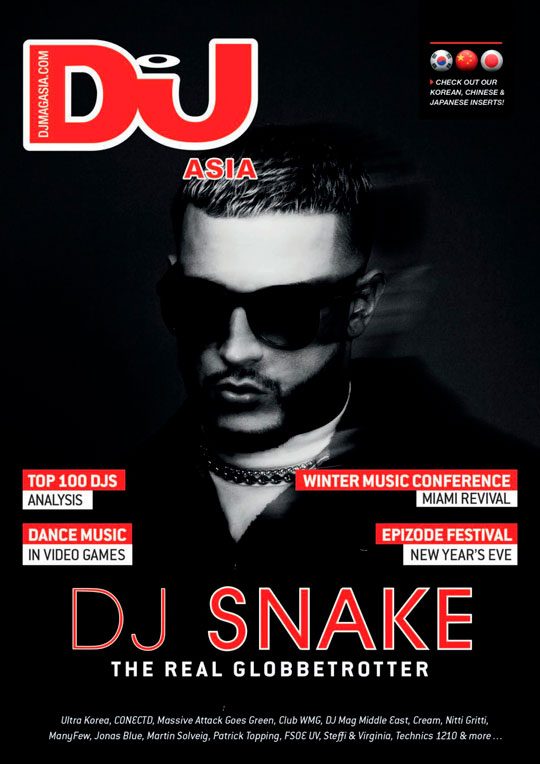English

Third Party DJs Interview
Meet the energetic progressive house duo from London!
Words: Kevin Kang
DJ Mag Asia sat down with Third Party, a DJ duo hailing from UK who dropped a new album ‘Together’ this March. The English progressive house duo, made up of Johnnie Macaire and Harry Bass, was just like their music; confident, down-to-earth, yet radiating positive energy. The duo has collaborated with the likes of Steve Angello, Martin Garrix and has also launched their own record label in partnership with Armada Music.
Q.You guys performed at the Hard Strike Music festival on Saturday. How did that go?
(J)That was awesome. We weren’t sure what to expect. One of the most energetic crowds ever. They just kept bouncing during the whole set. It made us very comfortable. It was our second live show in Korea. We have always been a bit more nervous during the live show because there’s more that could go wrong. But when you have a crowd like that, you just feel eased straight away.
Q.How was your gig at club Chroma?
(H)It was like an after play, a lot later than the main show. But there were people with all the Third Party merchandise like the t-shirts and stuff on. It was surprising because we thought it was kind of like a VIP Vegas club type thing. So we thought it was going to be just like tables and chill. But when we got there everyone was wearing our t-shirts. They had traveled all the way out to the club from the festival. So that was great. Respect!
Q.How do you think about the clubs in Korea in general?
(J)We have performed in 3-4 now and each one has been very good. Even the very first time we came, which was maybe like five years ago in Octagon was amazing. There’s a good fanbase here and Japan.
Q.You guys have been touring a lot in Asia. How are the crowds in Asia compared to their counterparts in UK?
(J)Definitely, like I was saying about Hard Strike festival, the energy level was like a workout. When you’re jumping for that load, you guys must have some good calf muscles. Because that really is a work out. But honestly compared to England, there’s a lot more jumping and move in the body and a lot more energy. And they know the lyrics as well which is great. We get that in places like England and a few other places in Europe but not everywhere. So there’s a lot of places in Asia like Japan and Korea that really know the songs.
(H)It depends where in Asia. Like here in Japan and Korea people really know the songs. They are the best.
Q.Last year in Ultra Korea you guys showcased a thank you banner in Korean during your live show. How did you guys come up with that?
(H)Our manager, who is my brother just researched it and made the banner. When we do the live show we play in live but we also have a live VJ with us who travels with us. So we always want to incorporate something special when we do those shows. It’s not just that we’re playing and singing but there are also visual elements. Not hard to do right? We try to do that everywhere we go if we are doing a live show. If we are just playing a normal DJ set, we don’t have a VJ so you can’t do too much. But when we do our live shows we try to tailor it for the fans. For our show in Japan we had an intro for the song Together and we had that come up in the right of where we are in Japanese. We also had pictures of the fans who sent their pictures in and that makes up the logo so as the intro builds it builds all the pictures with the logo.
That was the concept behind ‘Together’ because the music itself is more like for our fans rather than trying to make it commercial. We really wanted this album we weren’t too worried about crossovers it was really more like we’re just making exactly what we wanted what we know and what our fanbase wants.
Q.How did it all start? How did you guys get into making music?
(J)High school music club. Harry was already playing drums I was playing clarinet. Then we got to know each other and we made a couple of songs which weren’t very good. And yeah we kind of went from there. We thought we really enjoyed doing it and we thought maybe we could pursue this as a career we didn’t know much about DJing or anything that came after we moved to London and we learned dance music and it was a nice progression. We knew we wanted to make music and then we started clubbing in London when we were in college. And we were like alright this is what we wanted to do.
Q.What was the first DAW that you used to produce music?
(H)Cubase in school. We then transitioned into Logic. We went to college in London after high school and we learned Logic and Protools. And we also use a bit of Ableton as well now for like time stretching since they are very good for that.
Q.What is it like to work as a duo? Can you tell us about the pros and cons?
(H)Pros and cons are the same actually, because the con is that you argue a lot and you spend way too much spend time with each other. But it is also a pro because you can be honest like if the track is not good. Most of the time I would start the track and he would just be like “no”. And you know genuinely when someone is feeling it as well. And we can be honest with each other straight away you don’t have to worry about hurting others feelings. It’s quick and you also really know when each other likes or doesn’t likes something. That’s a pro.
(J)It means it takes longer to finish music because you both have to be happy with a track which could take time. But yeah, it could take longer because there’s two of us but hopefully by the end the music has gotten to a better place. It tends to make the final product we think is better than if it was just on your own.
(H)Also, another pro is touring. You don’t get lonely. Like a lot of our friends who are single DJs they say it’s a big problem. If you don’t have a tour manager with you, you could get like you know, we know people who have come back halfway from the tour because they were losing it. Especially with the whole attention on mental health and stuff from touring and stuff. And we definitely know people who struggled. Especially if you are genuine mates our manager is my brother as well so we’re pretty chill.
Q.How do you guys take care of stress?
(J)Meditation. I do actually meditate sometimes. But in terms of music you do need some stress. So it’s not good to just be completely without stress because then you wouldn’t push yourself. It’s good thing to have two people to keep each other on a certain path. DJing in general has got more comfortable for us. But when we do live shows we do get quite stressful because it’s a brand new thing. We do have to manage that since it’s a new thing to learn. But you just have to have faith in it.
(H)He is never stressed, I’m always stressed. So that balances out. I don’t think we do deal with stress that well. We’re not the best people to ask. We don’t have a strategy maybe that’s the problem.
(J) We’re working on it. But I think everyone is always working on it. You’re forever working on it.
(H) I think a big thing for us is that we produce and mix everything ourselves. So we are like doing the whole process. A lot of DJs now as we know, at the very least, someone’s mixing their tracks, if not fully ghost produced. That’s a stressful thing for us because we’ve never been able to let it go to a mix engineer or a ghost producer. So that’s quite stressful. During touring we always have to make sure we have enough studio time. Whereas I guess some people can go on tour and relax but we are always still thinking about the track that we have to finish.
(J) It takes time to work on good music.
Q.You guys had to work day jobs to fund music education early on in your career. How did you balance between work and music?
(J) Good question. I was kind of lucky with my job. So I could work 4 days on 3days off. So we would try to work so that we would have 2-3 days together back in the house in our living room which was our studio. We tried to make it so that we were both off at the same time. So it was tricky.
(H)We put it in during that time. We worked pretty hard. We do like our day job and then we come home and most nights we would be working. We were young so we didn’t need to sleep.
(J) Advice for people. When you’re younger just use the energy that you have. And you don’t need to sleep as much so just be lucky so that you can use it. And you won’t be able to do that all the time. You should try and find some sort of work that you kind of enjoy because you’ll need to put the hours in. Because if you enjoy the work it will help you put the hours in.
(H)I would say don’t do music unless you’re ready to work pretty hard. Because it is not like if you want to make money you go do something job where you make money easier. But music is like everyone wants to do it. It is one of them industries. So you have got to be prepared to work hard. A lot of people think they are going to get the Martin Garrix straight to the top, but that’s like winning a lottery. But for most artists it’s a hard work process.
Q.So what was the source of your motivation at the time? What kept you guys going?
(J)Good question. From my side. My love for music what probably just kept me going. I’ve always liked the fact that music that made me inspired not just to make music but just in life just gives you that motivation to wake up in the morning and go do this and that. It was good that you could maybe give that to someone else. I know that we always enjoyed playing our music to someone else and if they did really like it that was like a big burst. So kind of all of that was what motivated me.
(H)Like knowing that was what we wanted to do. And that if you worked hard enough we knew we could do it. So like we were writing songs that’s decent doesn’t sound right yet but with enough work I think that could work. So I think just like he said the love of music and the belief that if you worked hard enough. Faith.
Q.Do you guys have any tips on how aspiring producers can get their music noticed?
(H)It’s a hard one. But I think it’s a good one. For a long time everybody said just get out there and hustle and get your music to enough people. But I think it should be the opposite of that. I think just get your music good you know? Maybe in the beginning it was more about the hustling but especially now, there’s so much music that unless it’s good no one’s going to hear it. Just make it good first. So I think spend the time making it good first before you worry about all the other stuff. But then probably also hustle. But make sure it’s good first. So many people hustle with bad music.
(J)My add on to that would be I think in the process of making music and coming up you are being inspired by other people you would usually then fall into the category of a certain kind of music that you’re making probably the main DJs you love. A tip that I would give to someone starting out is that you should try and cater it a bit to the labels. So rather than just completely being 100% just making what you want and then firing it out to different labels, I would be a bit more like what is my sound, who is it like, what are they playing, let’s try to get on that angle a little bit. I’m not saying completely but I think that would help you just spark the career because as soon as you get a few going on the label then you are promoted and you’ll start meeting people.
Q.So can you guys tell us about your creative process?
(H)There’s a few different ways that it can start for our tracks. Johnny would spend a lot of his time trying to find a sample or a bit of magic from a record and if it’s like a nice starting point we would usually try to write around that. For most songs that might be the starting point. But now we do some vocal stuff and that would be more like sitting down with the songwriter just playing chords and starting with the vocals. But the one thing that is quite consistent with the songwriting is that we try to write the best moment first, like the real hook. So we keep working until we know we have like a magic, even if it’s a tiny little bit that’s really good and we would write around that. Usually I would say that is the one thing that is consistent. Whether it’s the melody, song, or vocal we always want to get one amazing bit first. We find the best bit first and then do the arrangement and the drums. Apart from that it’s always quite different. Finding that little ‘nugget’
Q.You guys have been working hard to push a strong progressive house vibe and in doing so you guys have always managed to throw in some UK elements in your music. Can you tell us about some of your influences in the UK scene?
(J) It’s many of the old guys. Like Fatboy Slim, especially for the sampling which is unbelievable. Back in the days when he was using tapes it was just mind-blowing. Also bands like Chemical Brothers and people like that.
(H)A big one for the sampling is Chase&Status, who is a UK drum and bass artist. They are like massive in the UK. Justice, they are not UK but they are close. And from the progressive house side I think Swedish House Mafia and Erik Prydz. Prydz is my number 1.
Q.Did you guys listen to these artists while growing up or did you find them out later?
(J) Yeah I’d say the Swedish House Mafia who were mainly individual back then, Deadmau5 who was new, Eric Prydz, old Chris Lake on Toolroom records.
(H) And then also some UK bands like Coldplay in terms of the uplifting sort of vibe. It’s hard to make people happy but it’s what they do for fun. We wanted to make it sound uplifting but not cheesy, Coldplay is like a big influence on that.
Q.You guys never bought the hype and always stayed true to progressive house. Tell us about how you fell in love with progressive house?
(J) Hard question. How do you fall in love? I think it’s like a feeling you just feel right and I that’s also why I think we have always stayed true to it because it just flows. It’s like how you live your life almost.
(H) We were taking a long time build a journey even though we’re in the big room side of progressive house we still try to keep that journey element and I think that’s just what we love about it. I think some genres, like the melodic genres like progressive house or trance there’s always got like a feeling to it that certain people would like and be fans of those genres, and I think there would always be a hardcore fanbase for the genre because it gives you the feels. And yeah that was it for us. It was that combination of dance music plus the feeling. We would still go to techno clubs and stuff, but my one thing is that progressive house and trance would always have that extra feeling to it.
Q.What would be your dream collaboration?
(H) Probably Coldplay
(J) Radiohead would be amazing. Don’t know how would it work but it would be an interesting collab. Harry got me into Radiohead. They kind of changed my outlook on how music could take you on an absolute journey from up and down and sad and happy.
(H) We always had a dream to collaborate with the Swedes and we did so that was a one that we did get to do. Our dreams came true.
Q.What is next for Third Party?
(J) For Third Party we have a couple of tracks that didn’t make the album so we’re hoping to have them finished really soon. One of them might be a very big collaboration so that’s in the works. So that’s kind of the plan for rest of the summer. In terms of doing a next album, we’re not even thinking about that just because the amount of work and that causes stress. Everything has to be put into that. If you want to make a proper album where it all makes sense from beginning to end, that is stress, but it’s the good stress. But I think we’ll relax on that for a while. That’s the plan.
(H) But at some point, we’ve got a couple of big tracks that could’ve been on the album but because they might be collaborations it couldn’t go on the album. But they are good tracks. Then we also have like something else that we’re working on but it’s under the radar.
Q.Can you say hi for the fans of DJ Mag Asia?
(J)We love our fans in Asia! Big love
(H)There are some markets where the people are into a certain kind of music because of the hype but in Asia, you really sense the people that they do love the music. Especially in Korea and Japan, it’s like they are not just in it because they just got into the festival and that’s what everyone does, but it’s like there’s a lot of people who really love the music and they know everything. So respect and love! Hope you guys enjoy the album!
May 10th, 2019








